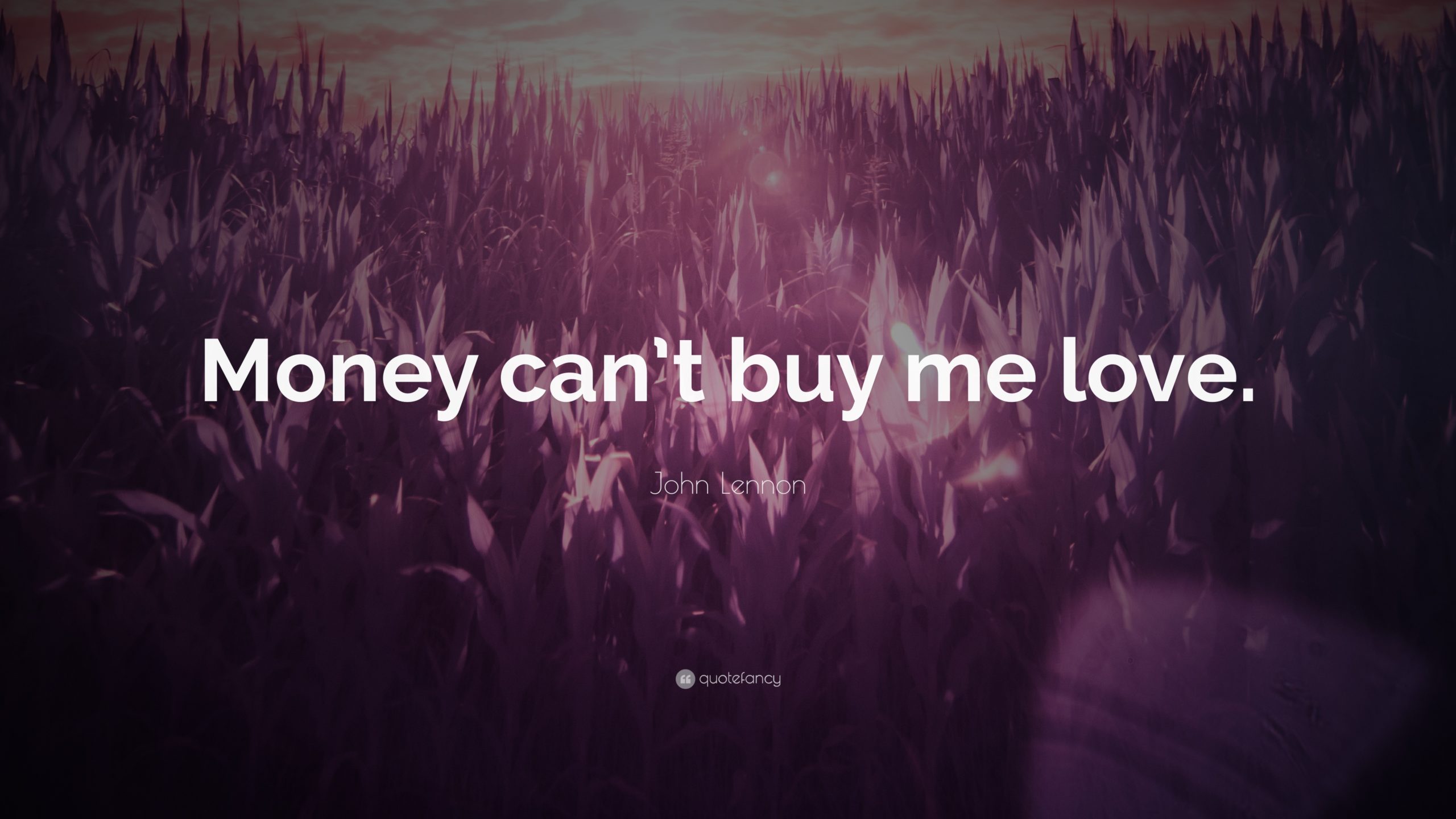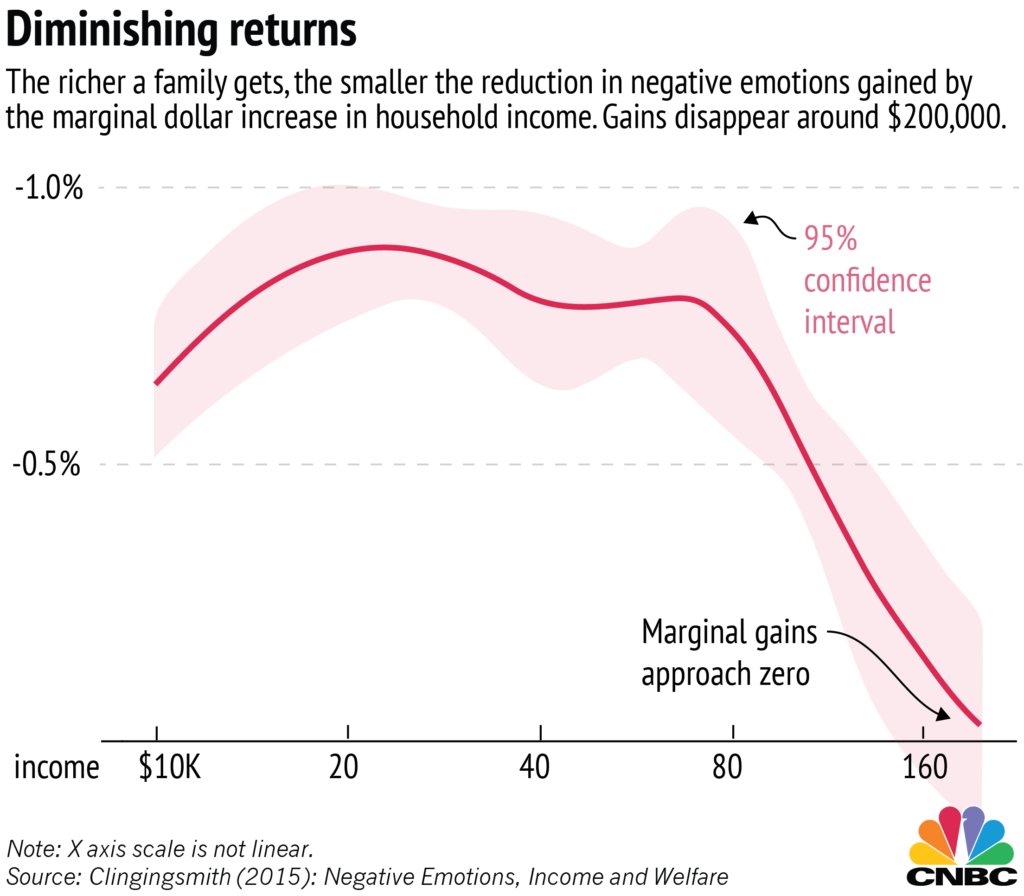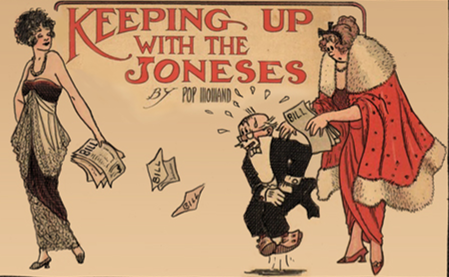
I was thinking about the balance between money, wealth and power, versus health, happiness and love. Is it versus or is it inclusive? Is happiness related to wealth, or is it true that money can’t buy you love?
Obviously it’s an existential question and, tbh, I’ve met many happy people who are dirt poor and many wealthy people who are miserable. The latter group is defined by materialism and status; the former group are defined by family and well-being.
The more you aspire for something, the more miserable it can make you. So, I decided to look up some research to see if this hypothesis is true.
The first thing I found was a study by Harvard Business School researchers Grant E. Donnelly and Michael Norton who surveyed 4,000 millionaires. What they found is that people with a net worth of $10 million are significantly happier than those in the $1 million to $2 million range but, and it’s a big but, happy millionaires were happier because they made the money themselves. Those who inherited or married into money were less happy.
Donnelly and Norton note the law of diminishing returns.
“The relationship between money and happiness has been studied for decades, and typically shows that money matters for well-being, but with diminishing returns: the difference in happiness between people with incomes of $50,000 and $75,000 is larger, for example, than between people with incomes of $75,000 and $100,000. The more we have of it, it seems, the more money wears off.”
In fact, what’s interesting here, is that there is a law of diminishing returns. Once you can cover the basics – food, shelter, transport, education – what more do you need? Most research proves that, after a certain point, you become less emotionally charged by wealth.
According to a study at Case Western University, the difference the marginal dollar makes in reducing negative emotions starts to fall off around $70,000, is very low by $160,000 and hits zero around $200,000.
So, how much money do you need to be happy?
I guess that relates to the cost of living. If you live in a country where the average price of a home is $500,000 and monthly billing for food, transport, education and such like is $10,000, then you need to be earning more than $150,000 a year to cover the basics. And I guess that is the core discussion: what are the basics and how much do they cost?
When I met dirt poor families who were smiling and happy, why were they smiling and happy? My supposition is love and family. They were surrounded by people who cared about them and they had all they needed there. Sure, money can’t buy me love but, more importantly, if I have love I don’t need money.
The greatest thing you’ll ever learn is just to love and be loved in return.
Oh dear, I’m getting soppy. Must be all those musicals I watch.
Yet, it’s interesting when you turn this up to 11. What makes billionaires happy? It’s not money or wealth.
In Rafael Badziag’s book The Billion Dollar Secret, he interviewed 21 billionaires over six years and concluded that such riches don’t make you happy, but they do magnify your personality. Happy people become happier and unhappy people become more miserable when they get wealthy.
In fact some research shows that the richer we get, the less happy we become. A study, published in the journal Nature Human Behavior in 2018 found that once we reach a certain level of earnings, then more income “tended to be associated with reduced life satisfaction and a lower level of well-being.”
And it’s not just adults who are impacted by this phenomenon. Children who come from affluent families are more likely to suffer from depression, anxiety and substance abuse than those who come from less affluent families, according to some research.
Why?
Because we need to keep up with the Joneses. If you haven’t heard that phrase, it’s an old one. In fact, the phrase originates with the comic strip Keeping Up with the Joneses, created by Arthur R. "Pop" Momand in 1913.
We have this never-ending need for status and recognition. It’s nothing to do with wealth, once you can cover the basics; it’s all to do with how others see us.
Psychologist Elizabeth Lombardo calls this the treadmill effect: “we think external things we buy will bring us happiness, but then we get them and we wonder ‘what’s next? ... that [next thing] has to be bigger and better” than what we had before and than what other people around us have.
But does that make you happy or happier?
Law of diminishing returns.
In fact, a lot of research finds that the more money you make, the more isolated you become. Research summarised by the Harvard Business Review finds that “wealth is isolating”. Psychologically, the acquisition of wealth and more generally, possessions that signal high status, makes us want to distance ourselves from others.
In other research, the richer you are the harder you work these days. Maybe that’s why the rich are isolating, because they’re working so hard.
Net:net from what I’ve discovered is that most people are happy if they can cover their monthly outgoings. The problem is that the more you earn, the more outgoings you create. Or maybe it's because you can't get no satisfaction?
“If your happiness depends on money, you will never be happy with yourself,” Chinese philosopher Lao Tzu
“What’s money? A man is a success if he gets up in the morning and goes to bed at night and in between does what he wants to do.” Bob Dylan
“Money only appeals to selfishness and irresistibly invites abuse.” Albert Einstein
“The more they think of making a fortune the less they think of virtue; for when riches and virtue are placed together in the scales of the balance, the one always rises as the other falls.” Plato
“Health without money is half a sickness.” et Johann Wolfgang von Goethe
“For a poor man also, who is miserly, will talk incessantly of the misuse of wealth and of the vices of the rich; whereby he merely torments himself, and shows the world that he is intolerant, not only of his own poverty, but also of other people’s riches.” Dutch philosopher Benedictus de Spinoza
“I’ve been rich, and I’ve been poor. It’s better to be rich.” American poet Gertrude Stein
“When I was young, I thought that money was the most important thing in life; now that I am old, I know that it is.” Oscar Wilde
Quotes stolen from Rainer Zitelmann
Chris M Skinner
Chris Skinner is best known as an independent commentator on the financial markets through his blog, TheFinanser.com, as author of the bestselling book Digital Bank, and Chair of the European networking forum the Financial Services Club. He has been voted one of the most influential people in banking by The Financial Brand (as well as one of the best blogs), a FinTech Titan (Next Bank), one of the Fintech Leaders you need to follow (City AM, Deluxe and Jax Finance), as well as one of the Top 40 most influential people in financial technology by the Wall Street Journal's Financial News. To learn more click here...



